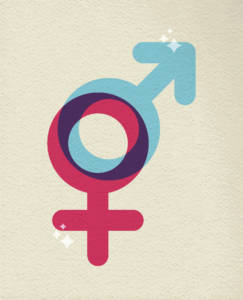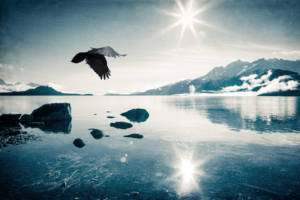
The modern term “Two-Spirit” is being used by some Indigenous peoples to speak to their experiences where gender, sexuality and spirituality intersect.
Prior to European exploration and colonization, some First Nations civilizations in Canada had less restrictive definitions of gender and sexuality. In several of these pre-colonial cultures, queer and transgender individuals made integral contributions. The modern term “Two-Spirit” is being used by some Indigenous peoples to speak to their experiences where gender, sexuality and spirituality intersect along with the histories of the special roles that many LGBTQ Indigenous peoples held within their tribes.
Contemporary Origins of the “Two-Spirit” Term
As the Canadian Encyclopedia details, “Two-Spirit” is a translation of the Ojibwa words “niizh manidoowag.” Manitoba First Nations activist Albert McLeod is credited with first developing the term, suggesting that it could refer to the Indigenous LGBTQ community at a 1990 meeting of the Native American, First Nations, Gay and Lesbian American Conference. After its positive reception at that event, the “Two-Spirit” concept began to catch on within many First Nations communities, and its usage slowly spread to groups in the United States over the next two decades.
LGBTQ People in Pre-Colonial First Nations Communities
Since each First Nations society in pre-colonial Canada possessed its own views on gender, sexuality and spirituality, the definitions used and the roles assigned to LGBTQ people would have vastly differed from tribe to tribe. The Canadian Encyclopedia does list a few examples from these cultures, such as the Cree terms “napêw iskwêwisêhot” and “iskwêw ka napêwayat” that refer to “men who dress like women” and “women who dress like men,” respectively.
Each society defined its own sets of roles assumed by queer and gender variant members. For example, people initially considered male at birth might have donned “feminine” clothing and assisted with weaving, cooking and crafting, while others normally assigned female at birth may have worn “male” apparel and joined the men of the tribe in hunting, healing and protective duties. Writing for the Dancing to Eagle Spirit Society, Sandra Laframboise and Michael Anhorn document that some groups performed rituals for children demonstrating these kinds of behaviors before puberty. At times, some civilizations believed they were powerful individuals who might be able to perform specific functions:
- Heal
- Prophesy
- Provide spiritual guidance
- Sing sacred songs
- Intercede on behalf of their people with the gods
Difficulties With Historical Sources
Many sources speaking about the “Two-Spirit” phenomenon may disagree with each other for a variety of reasons. Indigenous peoples have elucidated that not every pre-colonial American culture treated its LGBTQ members in the same ways. When each culture ascribed special statuses to queer and trans folk, this may have required specific processes undertaken by tribal leadership, as a 2006 New York Times piece clarifies.
Moreover, journalist Mary Annette Pember explains in a 2016 Rewire article that documentation of “Two-Spirit” traditions in Native societies was often written by non-Native individuals who lacked a deep understanding of the groups they observed, combining concepts and treating all these groups as if they were a single monolithic culture. She also emphasizes that “Two-Spirit” was developed in a modern context and that many LGBTQ First Nations people find it difficult to reconnect with their histories, thanks to the destruction of their heritage and older queer and trans Indigenous peoples remaining “in the closet” out of fear.
Recovering Lost Legacies
As Indigenous peoples in North American have contended with violence, the destruction of their families, cultural erasure, the loss of their tribal lands and even extinction, they have also attempted to retain or reconstruct their heritages. As part of these efforts, some LGBTQ First Nations people embrace the term “Two-Spirit.” While documentation is incomplete when it comes to the roles that queer and trans people used to play within their tribes, modern LGBTQ Indigenous individuals have used the “Two-Spirit” concept to create spaces of mutual support, forge identities and try to recover what has been lost.



